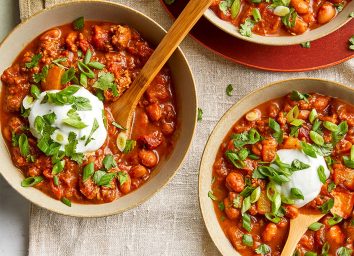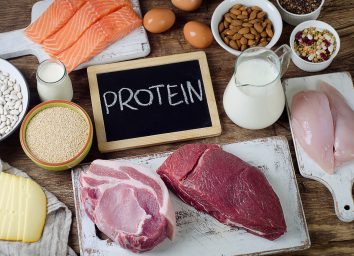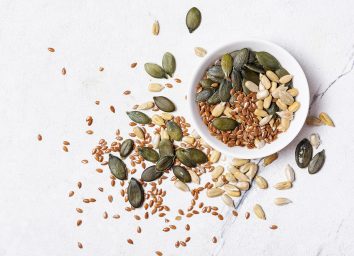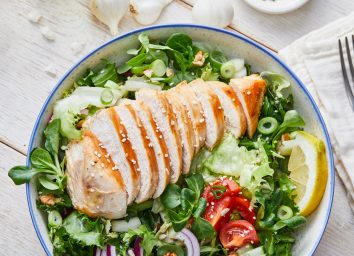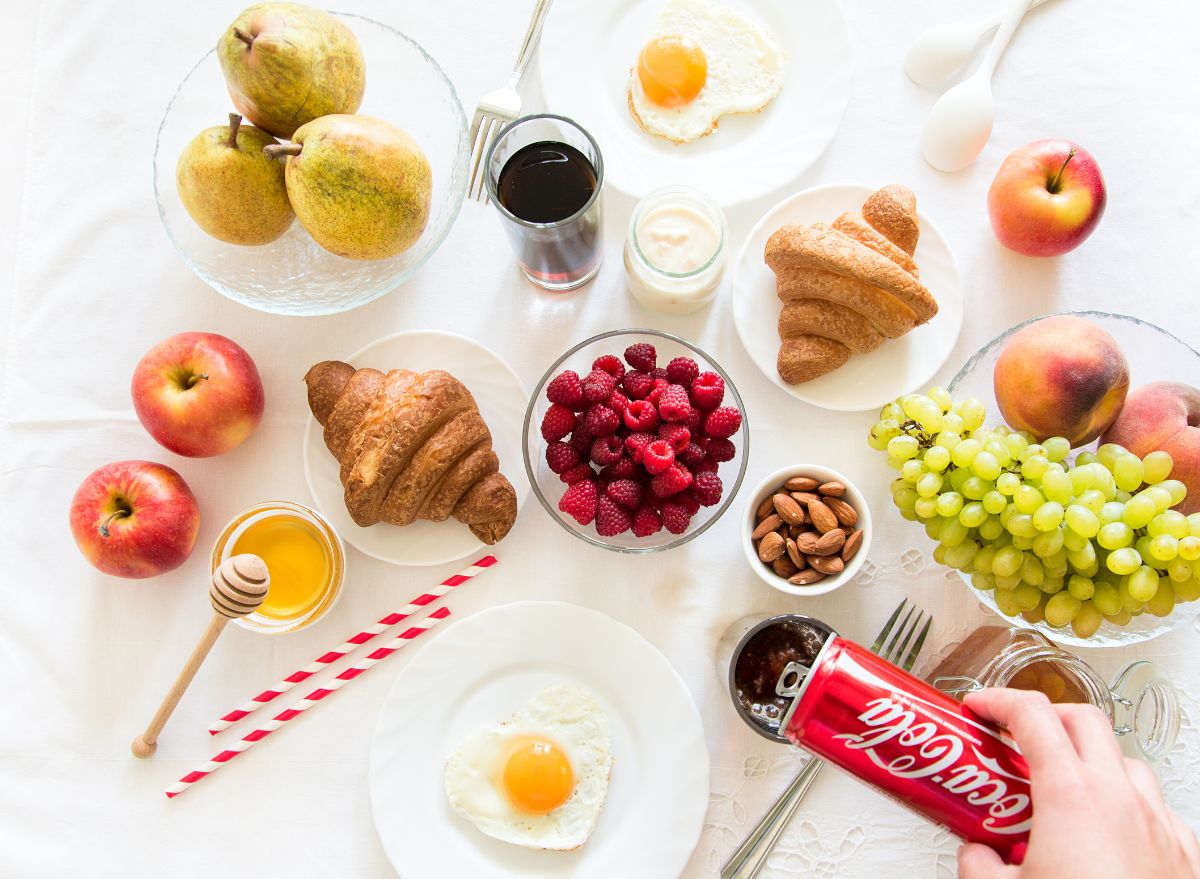
As the most important meal of the day, the quality of your breakfast can really make or break your potential productivity for the rest of the day. But after getting swept up in the morning rush, grabbing a quick fast-food breakfast is sometimes the best choice you have. Although finding a nutritious meal from the drive-thru can be challenging—after all, many fast-food breakfasts are loaded with empty calories and added sugars—it's not impossible.
In fact, many restaurant chains have made a conscientious effort to include healthier alternatives to their usual fried or sugar-laden fare, so it's easier than ever to find some healthy fast-food breakfasts that offer a decent balance of protein, fiber, and quality carbohydrates. But perhaps the biggest obstacle for today's consumer is recognizing which fast-food menu items are genuinely good for you, and which ones are health food imposters. Unfortunately, some of these "healthy" breakfast orders are just masquerading as healthy when they can contain more sugar than a 12-ounce can of Coke!
To put this in perspective, one 12-ounce can of original Coca-Cola contains about 39 grams of sugar, which equals close to 10 teaspoons of this sweetening substance. This comprises nearly 80% of the recommended limit for how much added sugar you should consume in a single day. While this figure is shocking in and of itself, imagine having a light fast-food breakfast that you believe to be nutritious and think is doing your body good, only to discover that it contains even more sugar than this indulgent beverage. As prolific singer/songwriter Alanis Morisette once said, "Isn't it ironic—don't you think? A little too ironic."
So, which seemingly "healthy" fast-food breakfasts actually have more sugar than a can of Coca-Cola? Keep reading to find out, and for more healthy eating insight to better inform your decision-making at the drive-thru, be sure to check out 11 Healthy Fast-Food Orders, According to Dietitians.
How much is too much sugar with breakfast?

"The amount of sugar that an average adult should limit themselves to in a healthy, wholesome breakfast can vary depending on individual factors such as overall calorie needs and health conditions," explains Mary Sabat MS, RDN, LD. "However, it is generally recommended to keep added sugars to a minimum."
"The American Heart Association suggests that women should aim for no more than 25 grams (6 teaspoons) of added sugars per day, while men should aim for no more than 36 grams (9 teaspoons) per day," says Sabat. "Considering this, it would be advisable to keep the sugar content of your breakfast as low as possible or opt for foods with little-to-no added sugars."
Echoing Sabat's insight on the AHA's recommendations, Lauren Manaker, MS, RDN, registered dietitian and author of The First Time Mom's Pregnancy Cookbook and Fueling Male Fertility, tells Eat This, Not That!, "Clearly, we should not be exceeding this quantity at breakfast time, as that would mean that you should consume zero added sugar throughout the rest of the day."
"The World Health Organization (WHO) suggests a similar guideline of keeping added sugar intake below 10% of total daily calorie intake, which is approximately 50 grams (12 teaspoons) for an average adult consuming 2,000 calories per day," Sabat mentions. "However, it's important to note that these recommendations focus on added sugars, not naturally occurring sugars found in whole foods like fruits and dairy products. It's generally advised to prioritize whole, unprocessed foods and limit the consumption of sugary beverages, desserts, and heavily processed snacks to maintain a balanced and healthy diet."
"A nice rule-of-thumb is to limit your added sugar intake at breakfast to around one-third of your daily allotment, which would be about three teaspoons (12 grams) for men and about two teaspoons (8 grams) for women maximum," advises Manaker. "If you find that you consume a lot of added sugar later in the day, this limit at breakfast should be even lower."
While we may aspire to have the time to whip up a well-balanced breakfast at home every morning, for many people, this isn't always a practical reality. We all have to lean on the convenience and accessibility of fast-food joints every now and then. And when a fast-food breakfast is your only or best way to eat your morning meal, abstaining from added sugars can be easier said than done. However, having an awareness of the recommended daily limits for sugar consumption and knowing which seemingly "healthy" fast-food breakfast menu items are actually overloaded with sugar can only empower you to stay in a more wholesome ballpark as you scan the menu.
How too much sugar in your breakfast can affect your health

Ordering a breakfast that's high in sugar can be a recipe for disaster. According to Sabat, eating too many grams of sugar in your breakfast is associated with several potential side effects, including:
- Weight gain: "Excessive sugar intake can contribute to weight gain as it provides empty calories without significant nutritional value," explains Sabat.
- Increased risk of chronic disease: "High sugar intake has been linked to an increased risk of developing chronic conditions such as obesity, type 2 diabetes, heart disease, and certain types of cancer," she says.
- Energy crashes: Consuming a large amount of sugar can cause a rapid rise in blood sugar levels, followed by a sharp drop, leading to energy crashes and feelings of fatigue," Sabat pontificates.
- Dental problems: "Sugar is a primary contributor to tooth decay and cavities, especially when consumed frequently and not followed by proper oral hygiene," she notes.
Suffice it to say, eating excessive amounts of added sugar regularly can do your body more harm than good. But, given that some sugar-packed fast-food menu items are presented as if they are totally wholesome breakfast choices, determining which meals are authentically nutritious and which are really just sugary charlatans can get tricky. To help you identify some of these unhealthy fast-food breakfasts that are disguised as 'healthy' choices, we've rounded up a list of fast-food breakfast orders with sugar content exceeding that of a 12-ounce can of Coke—which, remember, contains 39 grams of sugar.
Dunkin' Blueberry Muffins
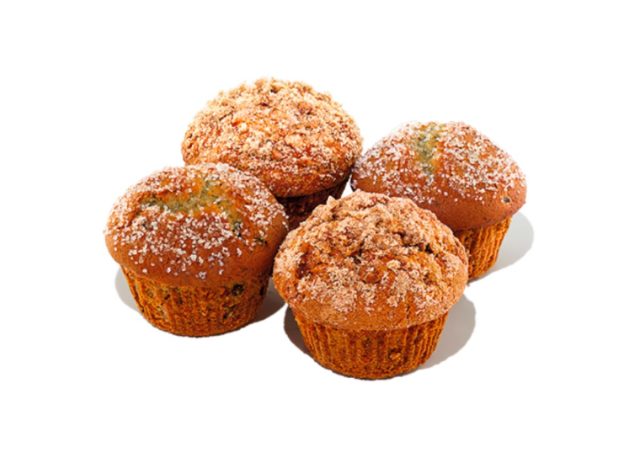
Sugar per muffin: 45 grams
You'd think that a breakfast food including fruit as nutritious as blueberries would be a bit better for you. However, the blueberry muffins from Dunkin' come in at 44 grams of sugar per muffin. The sugar content of this seemingly "healthy" high-sugar breakfast not only eclipses that of a can of Coke, but also contains only 1 measly gram of fiber, which likely won't do much to satisfy your early bird appetite.
Au Bon Pain's Blueberry Yogurt & Wild Blueberry Parfait
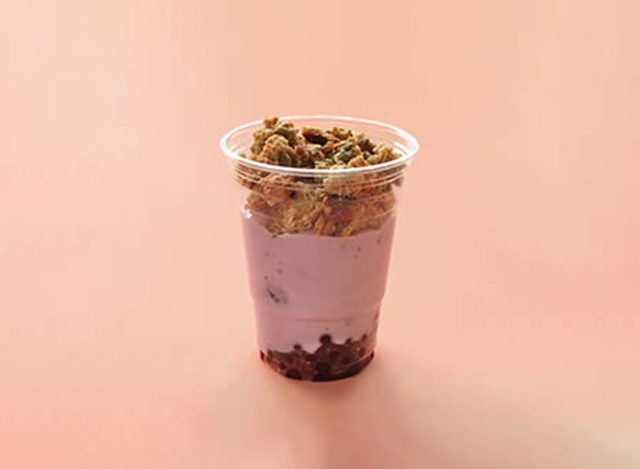
Sugar per parfait: 45 grams
Another go-to "healthy" breakfast order with more sugar than a can of Coca-Cola is Au Bon Pain's Blueberry Yogurt & Wild Blueberry Parfait. While wild blueberries are actually incredibly good for you—and even contain 33% more pigment-inducing antioxidants called anthocyanins compared to regular blueberries—the combination of granola and blueberry-flavored yogurt is the true source of this parfait's added sweetness. For a slightly less sugary choice, consider ordering Au Bon Pain's Vanilla Greek Yogurt Parfait with blueberries instead, which has only 31 grams of sugar in it.
Cranberry Orange Muffin From Panera
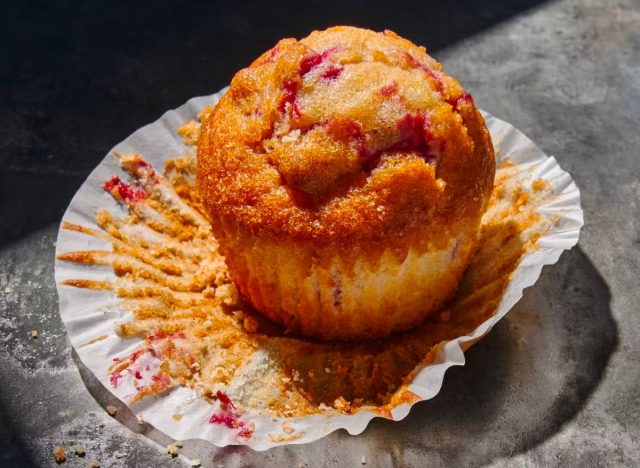
Sugar per muffin: 42 grams
At 42 grams of total sugar per single Cranberry Orange Muffin from Panera, this seemingly healthy breakfast order eclipses the sugar content of a 12-ounce can of Coke by 3 grams of sugar. Though a seemingly small difference, this teeny muffin packs an extra sugary punch courtesy of a turbinado sugar-encrusted top.
Pumpkin Muffin From Panera
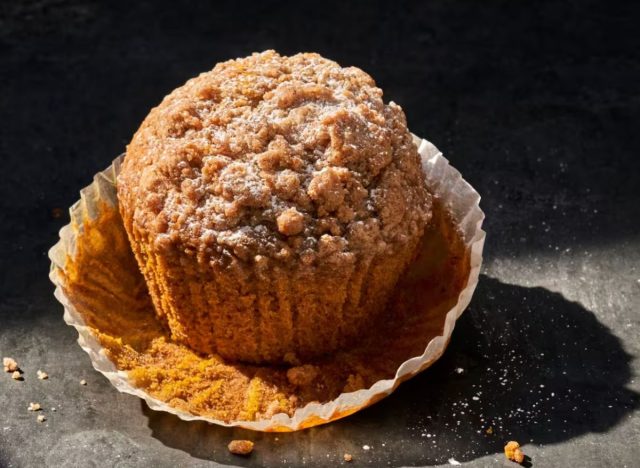
Sugar per muffin: 40 grams
Although this muffin contains real pumpkin, it's also topped with powdered sugar and streusel, which will inevitably detract from this item's potential healthfulness while simultaneously upping its sugar content. At 40 grams of sugar per muffin, just one of these autumnal-flavored baked goods comprises 80% of your recommended daily sugar intake.
Fresh-Baked Oatmeal Bars From Wendy's
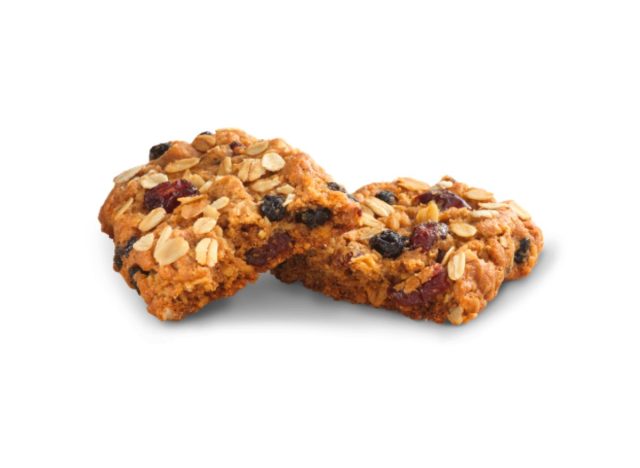
Sugar per 2 bars: 46 calories
Although you can always limit yourself to eating just one of these Fresh-Baked Oatmeal Bars from Wendy's, if you're hoping to have a breakfast that actually sticks to your bones, your natural instinct may be to order two of these. Given that oatmeal is generally hailed as a nutrient-dense, fiber-packed breakfast choice, you might expect that other oat-forward recipes would be equally as nutritious. Unfortunately, this isn't quite the case with these Oatmeal Bars. At 280 calories and 23 grams of sugar per bar—46 grams of sugar for two—your "healthy choice" has more in common with an oatmeal cookie versus hot cereal.
McDonald's Small McCafe Latte and Fruit & Maple Oatmeal
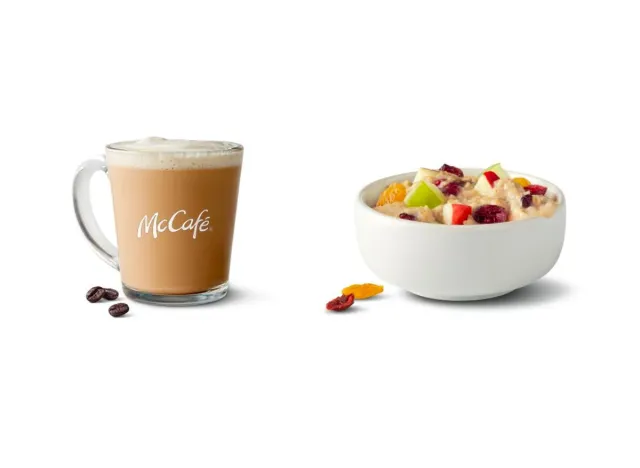
Total sugars in this order: 42 grams
When consumed independently of each other, these breakfast items don't seem so bad in terms of the amount of sugars they contain. While one small McCafe Latte only has 11 grams of sugar, a bowl of Fruit & Maple Oatmeal has 31 grams of sugar. However, the reason why this combo made our list is because, more often than not, if you're ordering something to eat, you'll likely want a beverage as well—especially in the morning. And despite your best efforts to keep your sugar consumption relatively low in the morning, these combined numbers can sneak up on you if you're not careful. (That said, there are far worse meal combos one can order for themselves at McDonald's; check out the 10 Worst McDonald's Orders, According to Dietitians.)
So if opting for a drive-thru meal, consider making your own coffee at home or vice-versa. This will not only do right by your daily sugar budget but also save you a little money, too.
Au Bon Pain's On-the-Go Granola & Fruit Cup
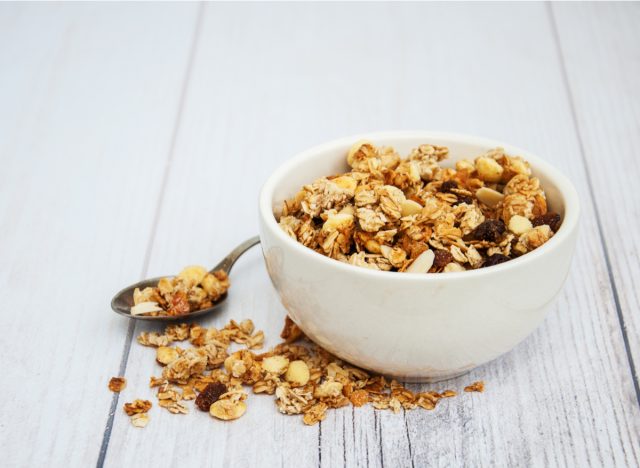
Total sugars in this order: 51 grams
A cup of fresh fruit is always a healthy choice. So despite containing 16 grams of sugar, the Au Bon Pain Fruit Cup is a fine standalone pick-me-up when in need of a light breakfast on the go. That said, a single fruit cup isn't enough to qualify as a well-balanced breakfast on its own. With this in mind, most people may find themselves gravitating toward other seemingly healthy choices, like Au Bon Pain's Signature Granola—but fair warning that this item contains a total of 35 grams of sugar. Combined, you have a fairly small meal that has 12 more grams of sugar than a 12-ounce Coke.
- Source: https://www.heart.org/en/healthy-living/healthy-eating/eat-smart/sugar/added-sugars
- Source: https://www.heart.org/en/healthy-living/healthy-eating/eat-smart/sugar/sugar-101
- Source: https://www.who.int/publications/i/item/9789241549028
- Source: https://www.ncbi.nlm.nih.gov/pmc/articles/PMC6959843/#:~:text=Findings%20from%20large%20cross%2Dsectional,et%20al.%2C%202006%5D.
- Source: https://www.ncbi.nlm.nih.gov/pmc/articles/PMC8391470/
- Source: https://www.nature.com/articles/s41430-021-01005-1
- Source: https://jamanetwork.com/journals/jamainternalmedicine/fullarticle/1819573
- Source: https://pubmed.ncbi.nlm.nih.gov/29801420/
- Source: https://www.medicalnewstoday.com/articles/297600#effects-on-the-body
- Source: https://www.ncbi.nlm.nih.gov/pmc/articles/PMC9020561/
- Source: https://pubs.acs.org/doi/abs/10.1021/jf060300l?journalCode=jafcau+

